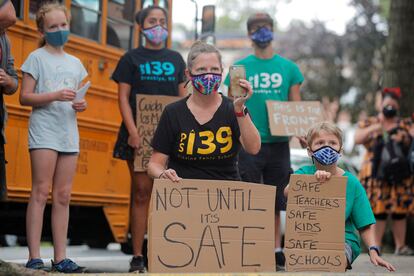US schools provide a new front in the country’s culture wars
Mask mandates and the teaching of critical race theory and transgender issues have been met with anger by some parents, who have insulted and harassed educators and even issued death threats


The culture wars engulfing the United States today have a new front: school board meetings, where residents from a school district discuss issues such as teachers’ salaries or cleaning services at the education centers within their district. However, over the past year and in various parts of the US, these meetings have become the scene of protests, which at times have turned violent, led by parents who are against a “toxic political agenda” that includes mandatory masks in classrooms, new approaches to critical race theory and policies to integrate transgender people.
In recent months, several members of these school boards have received death threats and threats of sexual assault and rape, insults and harassment inside and outside of meetings, which since October have been monitored by agents from the Department of Justice. Factions have also arisen within the school boards themselves, and it is common to see one group wearing masks and another not doing so, to make it clear which side of the divide they are on. Such is the level of politicization that conservative and progressive groups have poured huge sums of money into the election of board members to try and ensure that their position achieves the highest possible level of representation.
Over the past year around a hundred groups have sprung up in defense of the “rights of parents,” where members vent their fears and anger
Against the backdrop of this unprecedented scenario, several right-wing politicians have appropriated the message of the “rights of parents” to gain political capital. A few weeks ago Republican Glenn Youngkin was installed as governor-elect of Virginia on the back of a campaign that attacked “leftist indoctrination” in the classrooms. It was the first time in 12 years that the Democrats had failed to win in a state that proved decisive in Joe Biden’s presidential election triumph in 2020. The Republicans have discovered a fissure running across the national political map and are seeking to win over voters among outraged parents ahead of next November’s legislative elections, when the conservatives will attempt to wrest back control of the House and the Senate.
On the day that the engineer and university lecturer Sami Al-Abdrabbuh was re-elected to the board of Corvallis School District in Oregon state, an individual traveled to his neighborhood and announced his intention to kill him. That same day, a campaign poster for Al-Abdrabbuh was found at a shooting range, riddled with bullet holes. “That really disturbed me,” says Al-Abdrabbuh over the phone. The professor went to the police and changed his daily routine as a precaution. After he told his story to The New York Times, where he explained how much he enjoys being part of the educational community but was not willing “to die for it,” the harassment increased and he installed security cameras outside his home. There are other parents who say they have received death threats, although they are a minority in this complex panorama.
Al-Abdrabbuh says that what is happening seems “very strange” to him because normally “people who are in disagreement voice their opinion in a civil manner.” However, what is happening has been simmering for some time. First, the decision to keep schools shut last summer and autumn in Democrat-run areas, while Donald Trump pushed for on-site classes to be resumed, angered many parents. Toward the end of 2020, parents started to participate more actively in the school boards to ask for explanations over the health measures during the pandemic and set up Facebook groups to vent their frustration. The pressure applied by some school boards bore fruit, which in turn led parents to get more involved. Some meetings ran until 1am or 2am as hundreds of people took their turn to speak.

In recent years several districts, the majority of them progressive, have approved policies to safeguard the rights of transgender students, while promoting activities to encourage “diversity, equality and inclusion” in terms of race and gender. Some of these initiatives have met with resistance from conservatives in the same areas, who until now had not presented a united front in their discourse. However, over the past year around a hundred groups have sprung up in defense of the “rights of parents,” where members vent their fears and anger. These have labeled members of school boards with a different viewpoint as “Marxists, pedophiles and traitors,” as can be seen in videos that have gone viral on social media.
Action 1776 is one such organization. The group’s objective is to reinstate the 1776 Commission, which was set up during the Trump administration to promote “patriotic education.” One of Biden’s first acts as president was to dissolve the commission, which itself was a response to the The New York Times’ 1619 Project, a historical analysis of how slavery molded the US institutions in every aspect, to coincide with the 400th anniversary of the arrival on US soil of the first slaves from Africa.
“It’s not accurate to say that parents are protesting against the teaching of these issues. They are opposed to the blatant promotion of a radical ideological agenda that goes against their values and the values on which this nation was built,” says Adam Waldeck, president of Action 1776. In his view, the spark that led to this battle came during the pandemic when children were being taught at home and their parents were “horrified” to see what they had been learning at school.
Districts in conservative states such as Texas, Kansas and South Carolina have temporarily removed biographies of LGBTQ+ people from school programs, as well as books including The Handmaid’s Tale by Margaret Atwood and The Bluest Eye by Nobel Prize-winning author Toni Morrison, who became an involuntary protagonist in the Virginia election due to a Republican crusade against her literature. “I think we should throw these books in a fire,” said Rabih Abuismail, a member of a school board in Spotsylvania County, Virginia, over works that in his view held “sexually explicit” content.
Last autumn Scott Mineo, a 49-year-old white security analyst, founded Parents against Critical Race Theory (PACT), a group that challenges the academic doctrine that suggests slavery in the United States is the origin of the systemic racism still present in today’s society. Critical race theory is not taught in high schools but at university level, and colleges across the US, particularly in the aftermath of the death of George Floyd in May 2020, have embarked on initiatives to promote racial justice, adopting measures such as the increased hiring of people from diverse ethnic groups, teacher training courses on racial prejudice and the inclusion of books by African-American authors in school programs.
Mineo, and the tens of thousands of supporters of groups like PACT, believe that public schools are teaching children that “white people are implicitly biased and inherently racist, even if they don’t realize it.”
“Nobody has the right to shove this crap down our throats and to tell us we have to believe in it or we’ll be canceled. Honest debate over this issue is welcome, but forced acceptance is not,” says Mineo.
Al-Abdrabbuh says he understands why some parents are angry because the curriculums today are different from those they grew up learning. “But I also understand that they need to be aware it is unacceptable that education be geared toward the privileged community or race, and not for every culture.”
In October, the Department of Justice described the events of recent months as “an alarming spike in harassment, intimidation and threats of violence” against school board members. The United States Attorney General, Merrick B. Garland, ordered the FBI and federal prosecutors to work with local law enforcement to monitor threats against the people who work in the 14,000 public school districts in the US. The National School Boards Association compared some of the incidents involving its members to domestic terrorism, but later retracted this statement due to a backlash.
Tu suscripción se está usando en otro dispositivo
¿Quieres añadir otro usuario a tu suscripción?
Si continúas leyendo en este dispositivo, no se podrá leer en el otro.
FlechaTu suscripción se está usando en otro dispositivo y solo puedes acceder a EL PAÍS desde un dispositivo a la vez.
Si quieres compartir tu cuenta, cambia tu suscripción a la modalidad Premium, así podrás añadir otro usuario. Cada uno accederá con su propia cuenta de email, lo que os permitirá personalizar vuestra experiencia en EL PAÍS.
¿Tienes una suscripción de empresa? Accede aquí para contratar más cuentas.
En el caso de no saber quién está usando tu cuenta, te recomendamos cambiar tu contraseña aquí.
Si decides continuar compartiendo tu cuenta, este mensaje se mostrará en tu dispositivo y en el de la otra persona que está usando tu cuenta de forma indefinida, afectando a tu experiencia de lectura. Puedes consultar aquí los términos y condiciones de la suscripción digital.








































